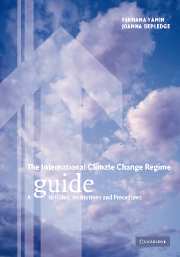Book contents
- Frontmatter
- Contents
- List of figures
- List of tables
- List of boxes
- Foreword by Joke Waller Hunter, Executive Secretary, FCCC
- Preface and acknowledgements
- List of abbreviations
- 1 Introduction
- 2 Overview
- 3 Regime participants
- 4 Objective and principles
- 5 Mitigation commitments
- 6 Flexibility mechanisms
- 7 Research, systematic observation, education, training and public awareness
- 8 Adaptation
- 9 Impacts of response measures
- 10 Finance, technology and capacity-building
- 11 Reporting and review
- 12 Compliance
- 13 Institutions
- 14 The negotiation process
- 15 Scientific and technical input
- 16 Administering the regime
- 17 Linkages
- 18 Evolution of the regime
- 19 Conclusion: taking stock and moving forward
- Appendix I List of Parties, their groups and key statistics
- Appendix II Annex I Party fact sheets: emissions, targets and projections for Annex I Parties and groupings
- Appendix III Table of Articles, issues and COP Decisions
- Bibliography
- Index
9 - Impacts of response measures
Published online by Cambridge University Press: 16 July 2009
- Frontmatter
- Contents
- List of figures
- List of tables
- List of boxes
- Foreword by Joke Waller Hunter, Executive Secretary, FCCC
- Preface and acknowledgements
- List of abbreviations
- 1 Introduction
- 2 Overview
- 3 Regime participants
- 4 Objective and principles
- 5 Mitigation commitments
- 6 Flexibility mechanisms
- 7 Research, systematic observation, education, training and public awareness
- 8 Adaptation
- 9 Impacts of response measures
- 10 Finance, technology and capacity-building
- 11 Reporting and review
- 12 Compliance
- 13 Institutions
- 14 The negotiation process
- 15 Scientific and technical input
- 16 Administering the regime
- 17 Linkages
- 18 Evolution of the regime
- 19 Conclusion: taking stock and moving forward
- Appendix I List of Parties, their groups and key statistics
- Appendix II Annex I Party fact sheets: emissions, targets and projections for Annex I Parties and groupings
- Appendix III Table of Articles, issues and COP Decisions
- Bibliography
- Index
Summary
Introduction
The term ‘impacts of response measures’ is not defined in the Convention and the Protocol but refers generally to the negative economic impacts resulting from the implementation of climate mitigation policies. These economic impacts arise from efforts to prevent climate change and thus have nothing to do with adaptation to the adverse impacts of climate change. The issue of impacts of response measures is focused on estimating the costs and benefits of mitigation, in particular with estimating spillover effects and welfare impacts resulting from actions to prevent climate change taken by one country, or set of countries, on other countries. Although the IPCC points out that most economic models tend to overstate their costs, and none can accurately predict these impacts on a country basis, it is widely agreed that a reduction in the demand for all forms of carbon-based fossil fuels is one of the consequences of efforts to mitigate climate change. The effects of response measures on energy demand, however, will vary according to fuel type, and the impacts of this on energy exports will vary considerably among energy exporting countries. Additionally, development and use of carbon sequestration technologies could potentially deflect the need to reduce demand for fossil fuels depending on whether such technologies prove economic and environmentally viable.
Because the world's economies are linked through international trade and capital flows, the issue of impacts resulting from the implementation of response measures is of interest to all countries.
- Type
- Chapter
- Information
- The International Climate Change RegimeA Guide to Rules, Institutions and Procedures, pp. 247 - 263Publisher: Cambridge University PressPrint publication year: 2004

